Jessica Lange: ‘I’ve Never Really Felt Like I Belong Anywhere’ — Certainly Not Hollywood
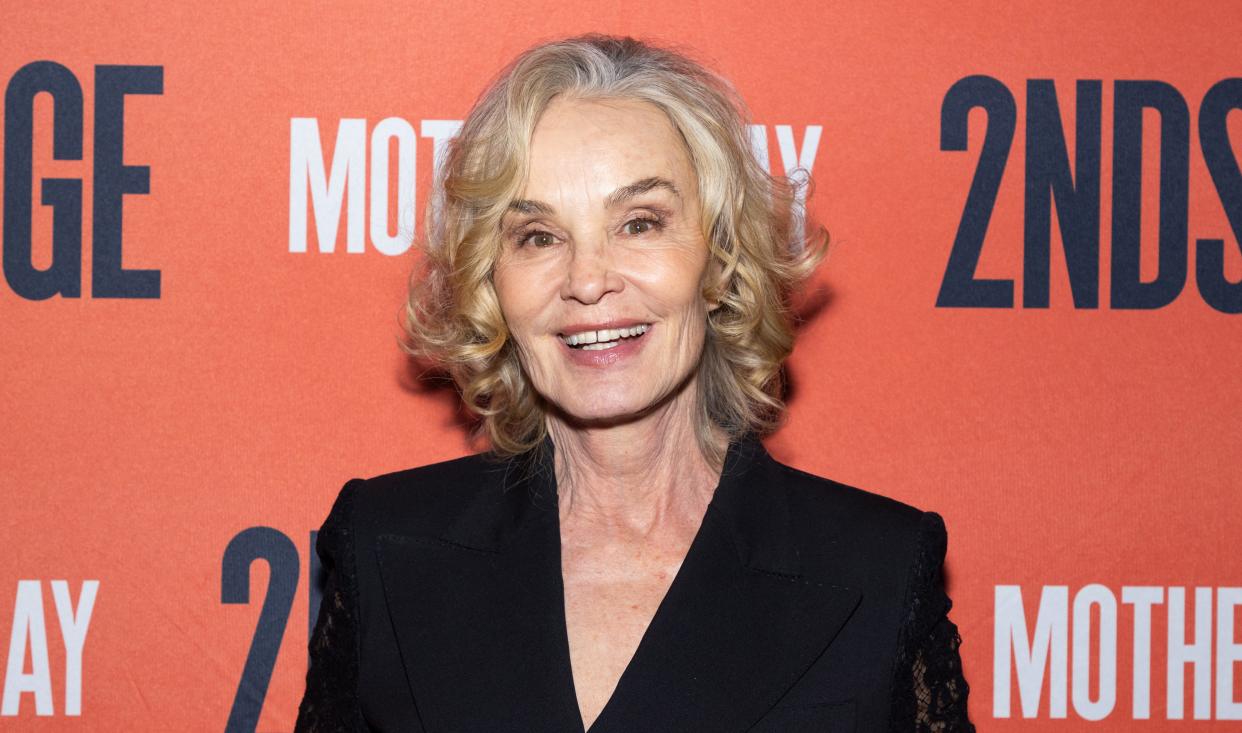
Jessica Lange plays the type of women you best keep your guard up around. Step carefully, or she could hurt you with a turn of phrase so gutting because it locates all your insecurities. But that’s also because these women are broken, too, and played with the rare cocktail of vulnerability, resolve, and brio that the two-time Oscar winner is known for on stage and screen.
In Paula Vogel’s (“How I Learned to Drive”) “Mother Play,” a “play in five evictions” now on Broadway as part of Second Stage Theater, Lange is Phyllis, a hardheaded, chain-smoking, martini-swilling matriarch and — oh, when hasn’t Lange played a hardheaded, chain-smoking, martini-swilling matriarch, or at least a complicated woman with a gamut of dependency and emotional issues? Stage roles in Tennessee Williams’ “The Glass Menagerie” or “A Streetcar Named Desire,” and Eugene O’Neill’s “Long Day’s Journey Into Night” put Lange in the shoes of theater’s most troubled women. On TV, she played Joan Crawford in the second and third acts of her life, for god’s sake, and was most recently the ghost of Truman Capote’s mother in “Feud: Capote vs. the Swans.” A role like Phyllis is hardly an anomaly in the Jessica Lange oeuvre.
More from IndieWire
“Mother Play” spans 40 years in the lives of Phyllis and her children, Carl (Jim Parsons) and Martha (Celia Keenan-Bolger), beginning in the early 1960s in Washington, DC. Both children reveal themselves to be queer in adulthood, challenging Phyllis’ conservatism and alcohol-fueled narcissism as the sort of mother who’s more parented by her kids than the other way around. Lange, unadorned by prostheses or any of the visual crutches of aging in front of a film camera, rather plays Phyllis agelessly over the decades and marks the passage of time with subtle shifts in physicality. One 12-minute scene finds Phyllis, now past middle age and empty-nested, alone in her apartment. Lange the only actor on stage, flipping channels, drinking by herself, heating up a TV dinner, fully living her loneliest life. It’s a riveting turn; Lange holds the audience on her own the entire time.
Lange earned her first Best Actress Oscar nomination for portraying the tragic downfall of Golden Age Hollywood actress Frances Farmer in “Frances”; she won her Oscar for playing a mentally unstable military wife in “Blue Sky.” She won her Tony for her performance as the morphine-addled matriarch Mary in “Long Day’s Journey.” In an interview with IndieWire, Lange spoke about what’s alluring about such dark characters, while admitting how exhausting “Mother Play” has been (she was slightly down with a cough when we spoke, three weeks after the Tony nominations were revealed. She’s up for Best Actress in a Leading Role for “Mother Play.”)
In the interview, Lange expanded on her recent thoughts about how corporate greed in Hollywood is crushing artistry. She most recently starred in HBO’s stage diva drama “The Great Lillian Hall” and is next starring in an adaptation of Joan Didion’s memoir about the death of her husband, “The Year of Magical Thinking” (“Is there a better book about loss?” Lange pondered).
This interview has been edited and condensed for clarity.
IndieWire: I saw the play in previews, but by now it’s well into its run. How has “Mother Play” evolved from the start?
Jessica Lange: Previews are always a little bit unsettling … we only had three weeks of rehearsal, which was insane for a play of this size and this emotional content. I wish we had another week or two weeks’ rehearsal before we went into previews, but whatever, it’s done now.
It just keeps deepening, in a way. You’re not thinking about everything now that’s second nature, [like] blocking. It’s true with Celia and Jim [also]. We’ve found variations on the themes. It continues to get deeper and to get more connected, the connective tissue is stronger. And it’s tighter.
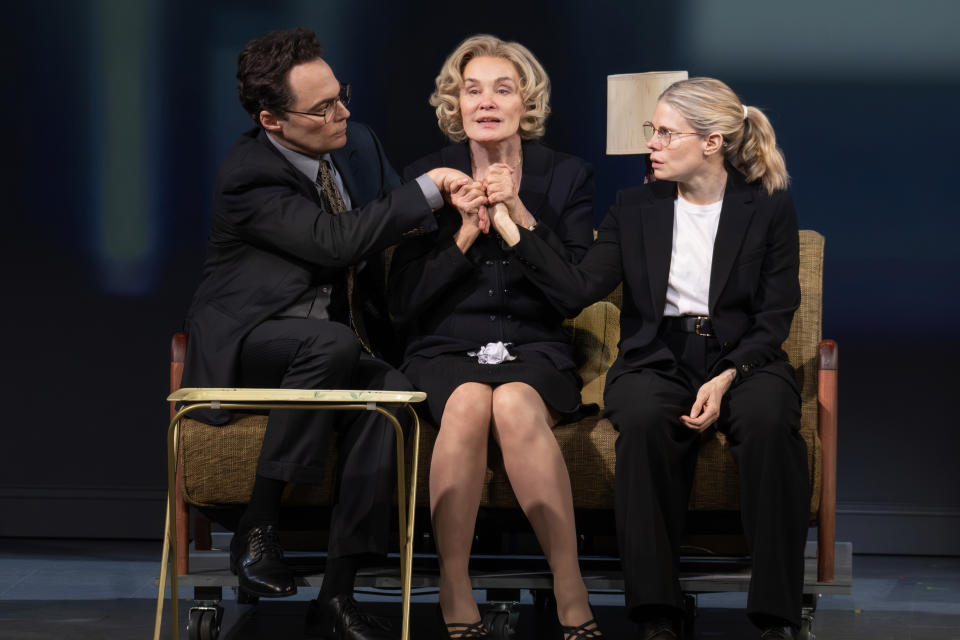
You have a show tonight. What’s your regimen on a day like today, other than taking these calls?
Excuse me, I am fighting this goddamn cough that’s just driving me insane. I’ve had it for weeks and weeks, and I can’t get rid of it, and everybody says, “Oh, everybody’s got that cough.” It’s nerve-wracking to be on the stage because you never know. Suddenly you get gripped by some spasm, but anyhow. I’m trying to rest today a little bit because with the coughing all night long, I never get a good night’s sleep. It’s been exhausting. When I can, I just rest during the day.
Do you take lozenges or gargle saltwater or something?
You have no idea, Ryan, what I do. Every medicine known to man, and nothing seems to work. I don’t know what this is.
I’m sorry to hear that. Congrats on your Tony nomination. You’ve won before, and you’ve won an Oscar. What’s different about those two awards for an actor? With the Tonys, there’s not the same level of dogged campaigning, and voters don’t have months to marinate on the contenders over catered luncheons.
The Academy is so huge and expensive. With the Tonys it really feels like part of the theater community, and that’s lovely to feel part of. I’ve never really felt like I belong anywhere. I don’t feel like I belong in Hollywood. Just recently, in the last production that I did, which was “Long Day’s Journey Into Night” — that was seven years ago now — it does feel like I’m part of the theatrical community.
You’re no stranger to playing troubled mothers like Phyllis. You have three kids of your own. What draws you to playing women such as these, other than great writing?
I’ve always been drawn to characters who seem to be existing on the edge but who are also, at the same time, survivors. Look at Blanche DuBois, who is tipping over the edge. So was Frances Farmer, and with a lot of the characters I play, even the lady in “Blue Sky.” Somehow they survive, and there’s something about that that’s very appealing to play. With Phyllis, when I read [the play] and started thinking about it, I had no idea that it would be such an emotionally violent experience, but it is. When I started playing it, I really had no idea how difficult it would be, but every night, going through that series of emotions, the unbelievable decisions and mistakes she makes, it takes its toll.
Ultimately, all you do is you play what the writer wrote. Whether you can find that in your own experience or whether it just comes through what you imagine. With Phyllis, I rely on my imagination because I don’t have those kinds of personal experiences in my life.
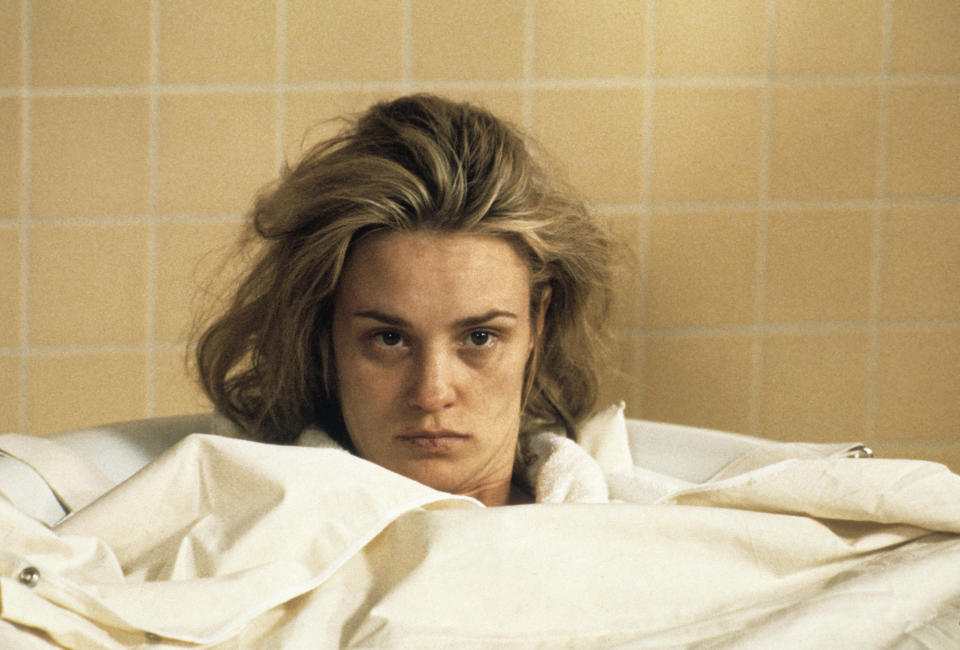
You’ve never done talk therapy. Is there some part of acting and performance that is therapizing in its own way?
I wouldn’t think of it in terms of therapy, but the explosion of emotions is what’s always appealed to me, and somehow you find some parallel in your own life or a parallel that you imagine, and it works. I don’t know if you are ever coming to some kind of revelation, but you are exorcising a lot of demons out there every night.
You had an interview in The Telegraph last year where you talked about how in contemporary film, there are too many cuts and no patience to hold on a performance. Now, that’s all I think about in every movie I see, so thank you for that. With the stage, it’s the opposite. That’s got to be part of the appeal.
You’re given the opportunity to just expose everything. There’s not any danger of being edited out or cut away or whatever. I don’t like that kind of filmmaking. Sometimes, I watch old movies and realize how powerful the directing was with its decision to allow an entire scene to play out in a medium shot or wide shot. The actors can hold it. It’s not a question of not being able to hold the audience’s attention. It’s this bizarre staccato. I don’t understand the cutaways, when you’re interested in what the character is doing, and you cut away to something else. I don’t know if the directors now feel like you can hold an audience’s attention for more than 30 seconds, but it irritates me, watching that kind of filmmaking. It makes me dizzy.
There’s a great scene of Phyllis alone onstage for 12 minutes slowly going into a stupor. You have to hold the audience that whole time on your own, almost wordlessly.
You always wonder, is this going to hold this time? Is this audience going to engage in those 12 minutes of this woman alone, in a room, basically doing nothing, the kind of ordinary tasks? What was really interesting for me to do was to imbue it with this extreme loneliness, and what that means to be estranged from your family. With Phyllis, she says, “My social life consists of talking to my mama on the phone and going to their apartment for dinner on Sundays”… how do you fill up those hours in the evening [in between] just to get through it? Coupled with that, she has some kind of self-imposed time where she can take her first drink, and then another time where she can take a second drink. It was a really good exercise to try to find, through expression and through the physicality, how you expose that loneliness. It’s one of my favorite scenes. I love doing it.
There’s another scene where you’re berating Martha while asking for one martini after another…
That’s much more explosive, that scene. After five martinis, it’s not even a martini anymore. It’s just straight from the bottle.
Nothing good can happen after five martinis.
No, nothing good can happen. There are a lot of people in the audience who understand that, who’ve had exposure to alcoholism in their lives, and who can relate to that, and how dangerous it is to be around people like that. The switches are so extreme and so fast and, in this case, she goes on the attack. She’s filled with a rage and a sorrow and, after five martinis, it all explodes.
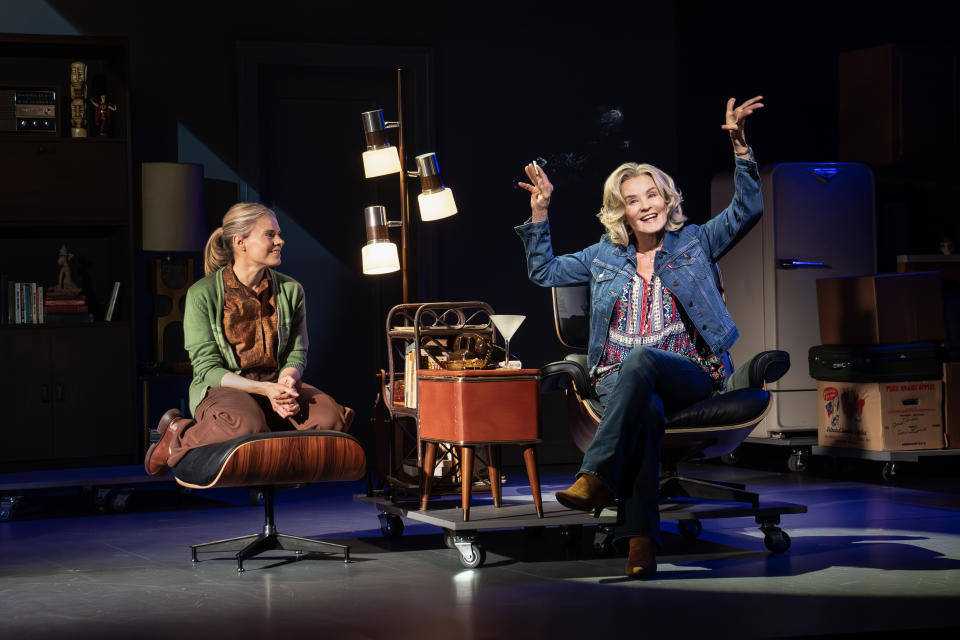
Until Phyllis succumbs to dementia you play her agelessly over the span of 40 years, whereas another actor would’ve done more to convey those time lapses.
Unlike film where you have all the devices to age, like prosthetics and wigs, we couldn’t do any of that. The only aging indications given to us, and it’s the same with Jim and Celia, you have to play it through voice or something physical. We were never like, “Oh, now she’s 60!” What I’ve tried to do is in the physicality of a woman who is in the beginning vibrant, and as she goes along, that’s more and more diminished.
What about Method acting? Have you ever tried that?
I studied with a woman by the name of Sandra Seacat for years, and she came out of the Strasberg actors studio, so I did a lot of those Strasberg exercises, like “private moments,” “sense memory,” “substitution,” and they’re very useful, I think. I don’t always adhere to that now, but every once in a while but I guess that’s what you would be referring to as Method acting. I’ve found those Strasberg exercises very useful over time.
What about when actors stay in character throughout a production, when the director calls “cut” and they don’t snap back into being themselves?
I’ve never done that, but maybe I should’ve. I don’t know. It was hard because I had my kids on the set with me and they were little. I’m not going to come off and be like some crazy woman with kids. I remember when I was doing Blanche DuBois on stage and I remember my daughter saying to me one time, she was probably only six, seven years old at the time, and she said, “Mama, do you think playing these crazy women is going to make you crazy?” I said, well, no, maybe it’s going to keep me from going crazy.
Broadway tickets have become exorbitant. It doesn’t feel like a democratic art form anymore. “Mother Play” is not meant to be this tourist-driving blockbuster, and prices are more accessible. Do you think inflation of ticket costs is hurting the theater?
[“Mother Play”] is nonprofit theater at Second Stage. It’s different from a commercial run. When it’s $300 or more, how do people go see plays like that? I don’t know. The extreme prices on some shows, I don’t know how they draw the audience. I haven’t had that experience because the last time I was onstage on “Long Day’s Journey Into Night,” that was at the Roundabout, so both the Roundabout and the Second Stage are in a different category than a commercial run.
You’ve also talked a lot recently about corporate greed that is squashing artistry in Hollywood. Do TV and theater offer respite from this?
All I can do is compare it to my experience making films when I first started in the ‘80s and even well into the ‘90s. It was a different world. There’s a lot of corporate takeover on all aspects of life in this country, and I certainly don’t feel it’s for the better, and that includes the filmmaking.
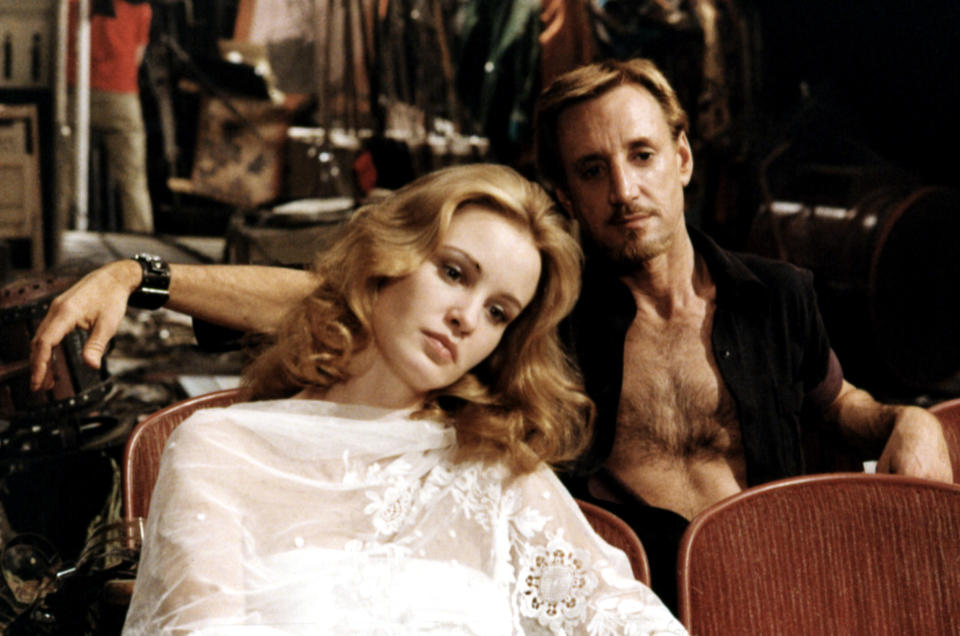
You’ve always done bold, challenging work going back to the early days of “The Postman Always Rings Twice” and “All That Jazz.” It’s rare to see these kinds of films in the mainstream. Are actors afraid of taking risks due to a star system that inhibits them?
No, I just don’t think [these roles are] available, really. Not the way they were 20, 30 years ago. How many of those films are getting made now, and how many get distribution? I don’t know. Everything costs so much money. I really don’t understand how the business works. I never have.
Faye Dunaway recently supervised a documentary about her life and work that premiered at the Cannes Film Festival. There are Liza Minnelli and Elizabeth Taylor docs coming up. Would you ever submit to a portrait like that?
Maybe if somebody wants to talk about my career, that’s one thing. About my life? No, I don’t want that.
Do you have any favorite memory of Bob Fosse or lessons learned? He gave you your first major role after “King Kong” in “All That Jazz.”
I absolutely adored him. He was incredibly supportive when a lot of people weren’t. I had just done “King Kong” and that was kind of dismissed as something irrelevant or, you know, the kind of dumb blonde… I think the only one who gave me a good review was Pauline Kael, and I was always grateful to her for that. But no, I was basically dismissed. There were no offers. So I left, came back to New York, and thought, OK, that’s just a blip on the radar. I’ll go back to New York, I’ll pick up where I left off, waitressing, taking acting classes, and at that time, Fosse reached out to me, and he wrote this part for me, which I always felt was so incredibly generous and kind of him. He really turned things around for me.
“Mother Play” closes June 16, just before the Tony Awards broadcast.
Best of IndieWire
The Best Father and Son Films: 'The Tree of Life,' 'The Lion King,' 'Nowhere Special,' and More
The 51 Best Sexy Movies of the 21st Century, from 'Spring Breakers' to 'X'
The 14 Best Thrillers Streaming on Netflix in June, from 'Fair Play' to 'Emily the Criminal'
Sign up for Indiewire's Newsletter. For the latest news, follow us on Facebook, Twitter, and Instagram.

 Yahoo News
Yahoo News 
